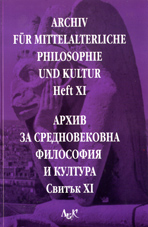„Да и Не" на Пиер Абелар в контекста на диалектиката и херменевтиката на дванадесети век
Abelard's "sic et non" in the context of 12th century's dialectics and hermeneutics
Author(s): Christine Latif Subject(s): Philosophy
Published by: Издателство »Изток-Запад«
Summary/Abstract: Hermeneutics of Abelard, known as "the knight of the Medieval ages" is a key for the whole scholastics and the philosophy of the West. The aim of this paper is to demonstrate how Abelard shows his hermeneutics in his attempt to solve the problem concerning the controversial statements of the Church Fathers as it is described in the prologue of his treatise "Sic et Non". The paper also presents the influence of the histiriographical and dialectical viewes and the new historical viewes which is of a great importance in his work. Abelard begins his prologue with with the reservation that, it should be not judged rashly about all the controversial statements of the saints. Abelard uses a few arguments to prove his thesis: a lack of grace in the understanding, difference in the usage of the words, errors in the copyng and translation, errers due to lack sufficient knowledge. Before one would say that a statement of that kind is wrong, one must know the dialectics, grammer, theology, language of the original text and history. Abelard says that there is nothing wrong in Gospel. How could we explain the errors in Gospel without doing a whole destruction of the authorities? There are errors which were made by the scribes. Abelard says that sometimes not the scribe is wrong but the authority itself. The saint is not guilty in his aim but he is guilty in the eyes of those who analyze the text too mechanically. That is how Abelard sets limits to the rights of the authorities without destroying their hierarchy. The book is not the first systematical explanation of the controversial statements of the saints. It is the second treatise where it is said that in the writings of the Holy Fathers a contradiction could take place. Abelard describes in the prologue some kind of rules to be followed and examined in every searching of the truth. In this point of view Abelard points out the main reasons for which the Christianity should strive. The aim of Abelard is to approbate the dialectical methods. This is the reason why there are no answers but only rules that could be useful in the attempt at finding the answers. The treatise is a practical manual for everybody who has problems in understanding a text and who has sufficient knowledge and power, and also skills to solve them.
Journal: Архив за средновековна философия и култура
- Issue Year: 2005
- Issue No: 11
- Page Range: 135-141
- Page Count: 7
- Language: Bulgarian
- Content File-PDF

